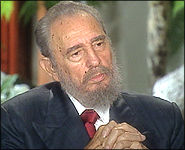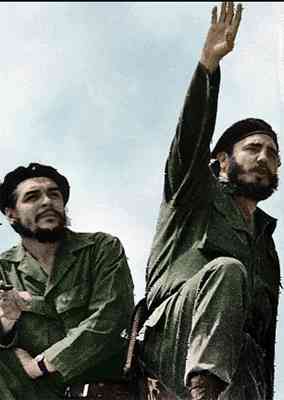August 13: Fidel Castro
Fidel Castro (1926)
It was on this date, August 13, 1926, that Cuban revolutionist and President-for-life Fidel Castro Ruz was born in Mayari, Cuba. Educated from the first by Jesuits, Castro took a Ph.D. in law in 1945 at Colegio Belén, a Jesuit preparatory school, in Havana. After 1950, he practiced law. The Fulgencio Batista regime, which came to power in a 1952 coup, and canceled elections in which Castro had planned to run, received major support from the United States, especially US corporations, and from organized crime.
Batista was allied with a Roman Catholic Church grown fat on favoritism and indifferent to the poor and politically disenfranchised. In 1953, frustrated at the dismissal of his court challenge of Batista, Castro led an attack on the Moncada Barracks in Santiago de Cuba. He was captured and imprisoned until a general amnesty in 1955. In exile in Mexico and the United States from 1955-56, Castro returned to Cuba and led armed attacks against the Batista regime for the next three years. Finally, on 1 January 1959, his revolutionists forced Batista into exile.
The US Government tried to depose Castro in the failed Bay of Pigs plot, and to assassinate him several times. It was this American repudiation that persuaded Castro to ally with the Soviet Union, a relationship that served him and the Soviets well until the Union disunited in 1990. Since then, the tiny island nation has struggled under multiple US embargoes that are increasingly counterproductive and divorced from good sense and humanitarian ideals.
Nevertheless, Castro has outlasted at least eight US presidents. And although the Catholic Church has excommunicated him, Castro never repudiated the Church. Only its notorious political meddling is outlawed – such as the Vatican dictating to politicians how they must vote on particular issues. Speaking with Chilean Christians in 1971, Castro said,
There is a great concurrence between Christianity's objectives and the ones we communists seek, between the Christian teachings of humility, austerity, selflessness and loving thy neighbor and what we might call the content of a revolutionary's life and behavior.
Human Rights Watch claims Cuba has a poor record on religious freedom: the Catholic church lacks almost all access to the media, endures strict limits on the numbers of its clergy, and is barred from operating schools. Given the history of the Catholic clergy in Cuba, these restrictions should not be surprising. But Cuba's constitution (Articles 54 and 55) guarantees the freedom to follow any God, or (unlike in the US) no God. In an interview published in 1985, Castro claimed,
No churches in Cuba were ever closed down – none of them. There was a time when the political confrontation became really fierce and, because of the militant political attitudes taken by some priests, especially the Spanish ones, we requested that they be withdrawn from our country. ... However, we authorized other priests to come to Cuba and replace the ones who were asked to leave. ... [The church] was a rancid aristocracy... It is not with religion that there were problems, but with the religious institutions.*
The Cuban Missile Crisis of October 1962 will be remembered (one would hope) as the closest the world ever came to nuclear war. It is fortunate that the conflict was resolved among three leaders unbeholden to religion: a Soviet leader who was an Atheist, a Cuban excommunicate, and a US leader who was elected on a promise not to take his orders from the Vatican. The outcome might have been different had one of those leaders been a fundamentalist with a solid sense of moral righteousness.
* Fidel and Religion, Conversations with Frei Betto, by Frei Betto, 1985.
Originally published August 2003 by Ronald Bruce Meyer.



